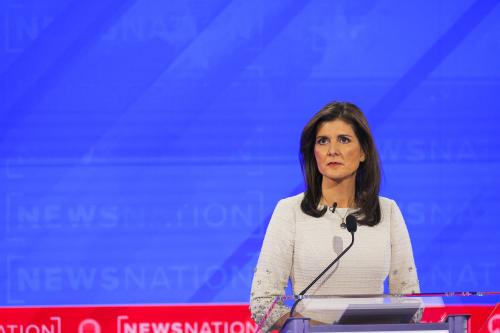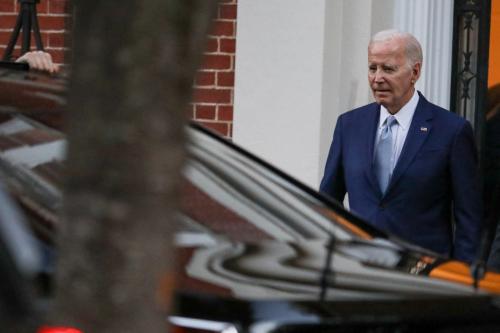As the country prepares for what looks like another controversial election year, the threat of violence against election officials is pervasive. Women make up 80% of election workers in the United States, and they face unique, gendered harassment. Conversations about threats to the American electoral system and legislation to address that crisis, however, too often leave out this critical dimension of the problem. But legal tools are available to make things better. The Violence Against Women Act of 1994 (VAWA) lays out confidentiality provisions aiming to protect personal information of survivors of domestic violence. If codified into state law, similar provisions based on those in VAWA could help protect female election officials in advance of the expected surge of election denialism in the 2024 election.
Gendered violence is explicitly used to intimidate female election officials, who receive the brunt of threats and harassment from election deniers. An investigation by Reuters in 2021 found that threats to election officials were typically generated by men and directed at a predominantly female workforce. Reuters found that dozens of these threatening messages used sexual or misogynistic language. Further research has shown that sexual intimidation and violence against women in political positions are increasing, especially in digital public spaces. These threats often include epithets and stereotypes, rape threats, and unsolicited commentary about women’s physical appearance and sexual desirability.
Even the female family members of male election officials can become targets. Georgia Secretary of State Brad Raffensperger was among a number of prominent election officials who publicly rebuffed former President Donald Trump’s attempt to reverse the state’s election results. Before election deniers trained their ire on Raffensperger, however, they threatened his wife, Tricia. She faced death threats and vulgar sexual insults. “Tricia got the first ones,” Brad Raffensperger said of the threats. “For some reason they targeted her.” The Raffenspergers’ daughter-in-law was also threatened and had her house broken into.
Gendered threats not only endanger female election officials’ safety and security but impede their ability to do their jobs. Colorado Secretary of State Jena Griswold has spoken about being a target of misogynistic harassment and threats as a female secretary of state: “Gender plays a major role. It plays a major role when you’re secretary of state. It plays a major role in your day-to-day — the threshold to be threatened for doing your job is much lower.”
Violence against election officials is contributing to attrition in the ranks. The Brennan Center for Justice found that one in five election officials are “very” or “somewhat unlikely” to continue serving through 2024. The election officials surveyed specifically cite attacks on the system and stress as their primary reasons for leaving. Data from the Pew Research Center shows that women who have been harassed online are “more than twice as likely as men” to report that they were “extremely or very upset by their most recent encounter.” This data signals a concerning threat to U.S. election security, given women’s overrepresentation among the country’s electoral workforce.
The issue of gendered violence against female election workers demands a solution not only for the sake of the women who make up the majority of election officials, but also for the sake of our democracy. Election workers are on the frontline of our democracy, ensuring that polling places are up and running, that every voter can cast a ballot, and that those ballots are accurately counted. The recent increase in harassment and harm directed at election workers has made it harder for officials to recruit and retain workers, which in turn makes it harder for them to run safe, secure, and efficient elections. Every attempt to harm or intimidate the women who serve their communities during election season or otherwise, is part of a broader trend to harm and undermine our election system. Protecting the women who play a critical role in our elections is a significant piece of the ongoing battle to protect our democracy.
In response to the stresses election officials must contend with, state legislatures are devising wider-reaching physical and cyber threat protections. Eleven states have passed comprehensive laws to protect election officials. While this is a helpful start, threats to female election officials cannot be effectively addressed by a “one-size-fits-all” policy response; they require a tailored approach that accounts for the gendered nature of the issue. The Violence Against Women Act of 1994 was passed in response to increasing violence against women and provides a useful legislative starting point for a tailored, female-specific anti-harassment law. The bill’s aims include reducing violence against women, securing offender accountability, and ensuring victim safety.
A critical portion of the law is its confidentiality provisions. Confidentiality provisions are measures to protect personal information of survivors of domestic violence and can provide opportunities for disciplinary action if personal information is disseminated. In VAWA, the postal service is responsible for regulations to protect the addresses of victims and domestic violence shelters. Lawmakers identified these measures as an effective means of preventing abusers from tracking their victims and causing them further harm. These provisions are codified in VAWA’s Subtitle G — Confidentiality for Abused Persons. The confidentiality provision in Subtitle G ensures the safety of adult, youth, and child victims of domestic violence, dating violence, sexual assault, and stalking.
Some states have folded confidentiality provisions into wider legislation meant to protect female election officials, though only one bill has been signed into law. Those prospective laws include:
California, CA SB1131: Passed (2021-2022)
- Bill explicitly expands the address confidentiality program for survivors of domestic violence to also protect election officials. Existing California law allows a voter’s status, home address, telephone number, and email addresses to be confidential if they seek confidential voter status certification. CA SB1131 adds public entity employees and contractors (groupings which include election officials) to the list of covered individuals.
Florida, SB 1920: Died in Committee (2022)
- Exempted certain information about election officials and their families from public record requests disclosure. The bill went as far as to protect the names and locations of “schools and day care facilities” attended by the children of current election officials.
Maryland, SB951: Referred to Committee (2023)
- Bill prohibits an individual from making available on the internet personal information regarding an election official or their family.
Minnesota, SF 4217: Referred to Committee (2022)
- Criminalizes any dissemination of personal information about an election official or their family or household member if the dissemination poses a threat to the official’s or family member’s safety or the person disseminating the information has knowledge of an imminent or serious threat.
Wyoming, WY H 139: Died in Committee (2023)
- Prohibits knowingly disseminating personal information about an election official or their family if the information poses an imminent or serious threat to the official’s or family member’s safety.
The policymakers who sponsored VAWA recognized violence against women as a societal issue and tailored a legislative approach in response. Female election officials face many of the same types of violence as women at large — physical and sexual intimidation, verbal abuse, stalking, and constant harassment — that VAWA’s confidentiality provision targeted. Women who serve in election posts should be awarded similar protections commensurate with the nature of the threat to their safety. The functioning of our elections, and therefore our democracy, depends upon it.









Commentary
One way to protect female election officials from harassment
December 11, 2023